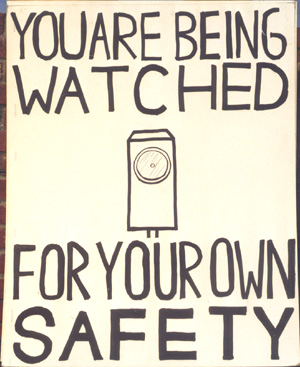
The idea that you are being watched by an unknown figure or
entity is always a scary thought and or feeling. I mean, there are some nights
where I am walking out of my living room to go upstairs to get ready bed, and
as I do so, I walk past the windows located throughout the house that are
seemingly covered with the blackness of nighttime. I know that the chances of
somebody watching me from there are slim, but I’ve seen enough horror films to
know that it’s technically a possibility, and I often can’t help but think to
myself, “someone could be staring right at me, watching me ever move”. It
always seems to cause me to put a little extra effort and speed into my legs as
I head up the stairs. What’s interesting about this is that even though the
chances someone is actually watching me from the windows are slim, I still get
that feeling more often than when I browse the internet, or search something on
google, where there is probably a higher chance of someone virtually spying on
my online data.
We all put some our most personal and imitate information
online. Some of it we put on their because we have to for our jobs or to buy
needed products. Others we put on the internet willingly and happily because
technology has made making personal connections and spreading your personal
identity easy and fun. No matter the reason, the privacy that we have is always
going to be subject to being compromised by an outside figure. The online black
market has plenty of scammers and hackers working hard to gather, buy, and sell
people’s personal identities. It’s becoming more and more frequent to the point
where it seems that our personal info and data is so accessible to outsiders
that our online identities are becoming devalued. In Maria Dubovitskaya’s TedTalk,
she explains how one’s phone number, name, date of birth, email address and
more had diminished in value over the past ten years on the black market, from
being worth 150$ combined to less than 1$ online. And she explains how this is
often because we’ve all gotten so comfortable with sharing personal information
over the internet. I think we all can relate to this in some way. We’ve all
been pushed towards using the internet to get things done from home that we
used to have to go out and do in person that we’ve just learned to accept that
putting our information out online is a necessity to enable the benefits that
technology offers. What’s so scary is that we could get so comfortable that we
eventually don’t care about our privacy online at all.
However, the black market isn’t the only thing to be worried
about with online privacy, as the government has a lot of interest and
investment into on and offline spying. Systems and corporations linked with the
government focus on keeping track of precise locations and movements, and these
TedTalks discuss this. What’s interesting about the government invading your
privacy online and offline is that the argument is that they are doing it for
the widespread benefit and protection of the public. The idea that setting up
these systems where the government can track your every move by identifying
license plates via webcams helps them track the bad guys who would commit
crimes. The government seems to have the right intentions, but what’s scary is
that they aren’t completely secure just because they are the government. Like
the Tedtalks said, we all use the same computers and smartphones with similar
security measurements. Governments may have more well-equipped security
measures, but are certainly susceptible to online hacks, such as in the 2016
election. All in all, it seems like privacy is a hard thing to be 100% assured
of.
Obviously with all that I’ve previously mentioned, privacy
online is certainly a hot-button issue, especially as we are currently all
stuck inside in the midst of a global pandemic. I was interested in what we can
do exactly to enhance our privacy strength. Derek Banta’s TedTalk provided some
insight on this, saying that rather than putting out more personal info to more
online sources, we put all our info into a backed-up, trusted third party
resource, which would create more anonymity. Instead of going directly to the
source, the third party would do it for you, giving an anonymous avatar. This
is such an interesting idea. It takes a lot of the value of our individual
purposes from the eyes of someone on the Black Market. Banta shows that
although there is a lot stacked against us in terms of complete privacy, we
still can create the measures necessary to ensure more safety online, which I
believe is going to continue to grow into a more pressing issue.



No comments:
Post a Comment